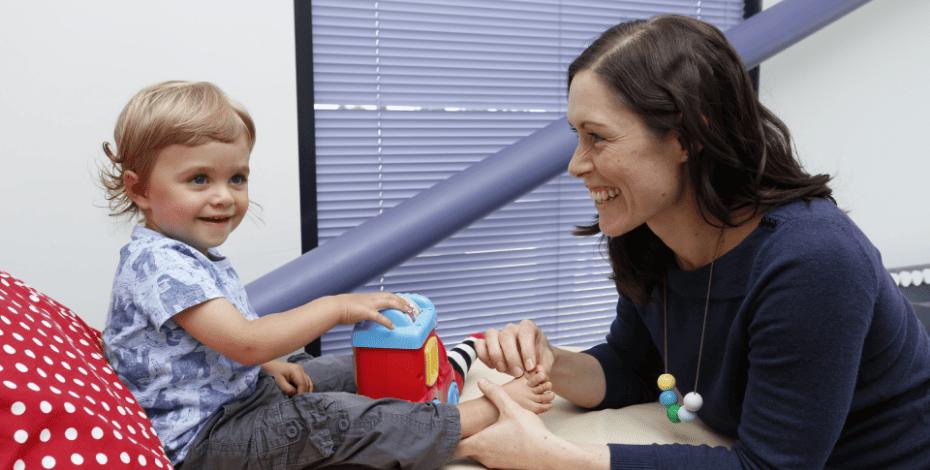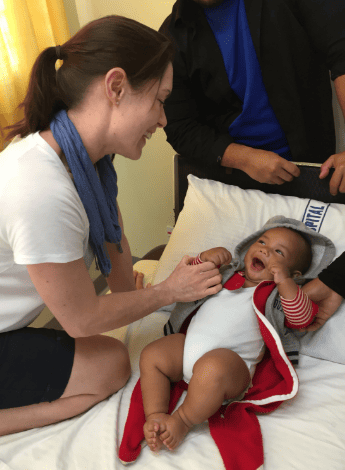
Helping children put their best foot forward

Rebecca Snowden has taken many small, deliberate steps in her paediatric physiotherapist career journey. But she took a big leap of faith when she was invited to help children and babies with a genetic condition known as club foot.
As a teenager growing up in Bendigo, Victoria, Rebecca Snowden MACP was always drawn to the idea of healing, although her initial career considerations varied between law and physiotherapy.
Ultimately she chose physiotherapy—a decision she’s never regretted.
‘My sister and I were the first in our family to attend university so it was a big deal,’ Rebecca says, reflecting on her path to studying at Charles Sturt University in Albury–Wodonga.
The rural setting and philosophy of the university resonated with Rebecca and helped to shape her career trajectory, emphasising the need for allied health professionals to work and live in country communities.
‘Out of our cohort, most of us went back to the country,’ Rebecca says.
‘I think it was a catalyst for lots of rural physios to start training in the country, which was really good.’
After graduating, Rebecca embarked on an adventurous and challenging career.
Alongside her husband Matt, who joined the Australian Defence Force as a physiotherapist, Rebecca accepted her first posting in Townsville, Queensland.
There she worked in private practice under Melissa Hooper, a mentor who helped her not only as a clinician but also as a future clinic owner.
‘Melissa was as much an amazing businesswoman as she was a physio,’ Rebecca says, noting that the experience taught her how to combine her clinical skills with the business acumen she was to rely on when she eventually opened her own clinic.
Rebecca’s early experiences in Townsville gave her career a strong foundation, which was particularly helpful when she transitioned from musculoskeletal physiotherapy to paediatrics.
In her subsequent role in community health, also in Townsville, Rebecca suddenly found herself with a case load of more than 100 patients, many of whom had complex needs.
The sheer diversity and demands of the job required her to adapt quickly and think on her feet, travelling long distances to provide care across rural areas in Queensland.
Working closely with other healthcare professionals in a multidisciplinary setting taught her the value of teamwork and a holistic approach to patient care.
‘We covered an enormous rural area. We had to travel four or five hours to see kids in schools and community centres.
'I had a very diverse, complex case load and this is where I learned the value of treating within the multidisciplinary clinic, working with speech pathologists, occupational therapists, other physios and social workers—all in the same room at the same time,’ Rebecca says.
A subsequent move to Sydney marked another turning point in Rebecca’s career.
She joined the Children’s Hospital at Westmead, where she encountered a new challenge—treating children and babies with congenital talipes equinovarus (club foot).
Rebecca mastered the Ponseti method, a technique that was gaining traction in Australia at the time and is still widely used today.
‘The Ponseti method was just starting to take off and I was lucky to be in the right place at the right time,’ Rebecca says.
The treatment involved using a series of casts to gradually correct the positioning of the foot.
Rebecca honed the necessary skills under the guidance of Tony Juarez, senior physiotherapist at the hospital’s Ponseti Clubfoot Clinic, who had championed the method in Australia.
Having mastered the technique, Rebecca soon put up her hand to join an international outreach program that brought the treatment to children and babies in the Pacific.
It was to be a volunteering experience that would leave a lasting impression on Rebecca.
‘I was invited to join Orthopaedic Outreach Australia, which conducted annual trips to Tonga,’ Rebecca says.
The trips were intense, beginning with Rebecca arriving days before the surgical team to triage the mainly paediatric patients.
‘I remember turning up on my first trip with kilos of supplies and no sleep, only to find 20 families already waiting for me at the hospital,’ she says.
The physical exhaustion of working long hours was outweighed by the rewarding experience of making a difference.
‘The families were the most patient and gracious people, thankful for anything that could be offered.’
Club foot is more prevalent in places such as Tonga due to a combination of genetic factors and the population’s smaller gene pool.
In these communities, the condition was historically viewed as a deformity that brought shame and affected individuals were usually hidden away, Rebecca says.
The outreach program Rebecca joined not only provided treatment but also helped to change cultural perceptions by normalising the condition as something that could be successfully addressed.
Working in Tonga brought Rebecca face to face with the harsh realities of healthcare in a resource-limited setting.
‘We treated some children with more than just club foot,’ says Rebecca, ‘including cases where the condition was part of a broader pathology like muscular dystrophy.’
Back in Australia, Rebecca moved to Launceston in northern Tasmania to take up a role as head of the physiotherapy department at therapy services provider St Giles.
She led a team of five paediatric physiotherapists, allowing her to share her knowledge and mentor physiotherapists who were developing their skills in paediatric physiotherapy.
Rebecca, who has been a member of the APA since 2003, became a Titled APA Paediatric Physiotherapist in 2010.
She says she is keen to continue on the career pathway, with a view to undertaking specialisation training down the track.
Wanting to return to mainland Australia and to a rural setting, Rebecca and Matt decided to establish their own practice, now known as The Physio Space, in 2014 in Bowral, New South Wales. They have since opened a second clinic in Moss Vale.

A young patient in Tonga engages with Rebecca during her volunteer work in the Pacific nation.
‘We didn’t want to be a generalist clinic,’ Rebecca says.
Instead, they aimed to provide a high level of expertise in several different areas, including paediatrics, sports injuries, rehabilitation and women’s health.
The Physio Space soon became known as a go-to place for parents seeking physiotherapy services for their children, reinforcing Rebecca’s belief that children require different care from adults.
‘Kids aren’t just little adults,’ Rebecca says. ‘Their needs are unique and the treatment approach has to reflect that.’
Over the years the clinic has expanded and Rebecca has played a key role in fostering a culture of mentorship.
She believes it is vital to guide young physiotherapists and help them build the skills necessary to excel in the field.
‘The first few years after graduation are critical,’ Rebecca says. ‘Finding the right mentorship can shape who you become as a physio.’
Rebecca’s own experiences across different settings— from rural health in Townsville to a large hospital in Sydney and now private practice—have allowed her to bring a diverse set of skills to her work and to offer valuable training to her team.
Rebecca’s career has also been shaped by her role as a mother. Setting up the practice while raising two young children provided both challenges and opportunities.
The flexibility of owning a clinic allowed her to balance her family life with her professional aspirations, a balance she and her husband continue to navigate.
‘It’s a family business,’ says Rebecca, noting that their children have grown up seeing the hard work that goes into running a clinic.
In addition to her work with club foot, Rebecca has developed interests in other areas of paediatric practice such as growth-related injuries and adolescent sports injuries.
This reflects her earlier experiences working with mentors who specialised in adolescent sports and musculoskeletal physiotherapy.
She has also explored complementary therapies such as yoga and Pilates to make treatments more engaging for children.
‘You can’t just tell a kid to do a squat,’ she says. ‘You have to make it fun and change the environment.’
Rebecca’s journey is one of perseverance and growth, driven by a deep-seated desire to help others.
From her early days as a student to running a successful clinic and volunteering in the Pacific, Rebecca’s career has reflected a dedication to physiotherapy and to making a lasting impact on the children she treats.
‘I’ve received far more from my patients than I could ever give them,’ she says.
For Rebecca, each day brings new challenges but it also offers the chance to learn, grow and continue a career that has always been more than just a job—it’s a calling.
© Copyright 2025 by Australian Physiotherapy Association. All rights reserved.





